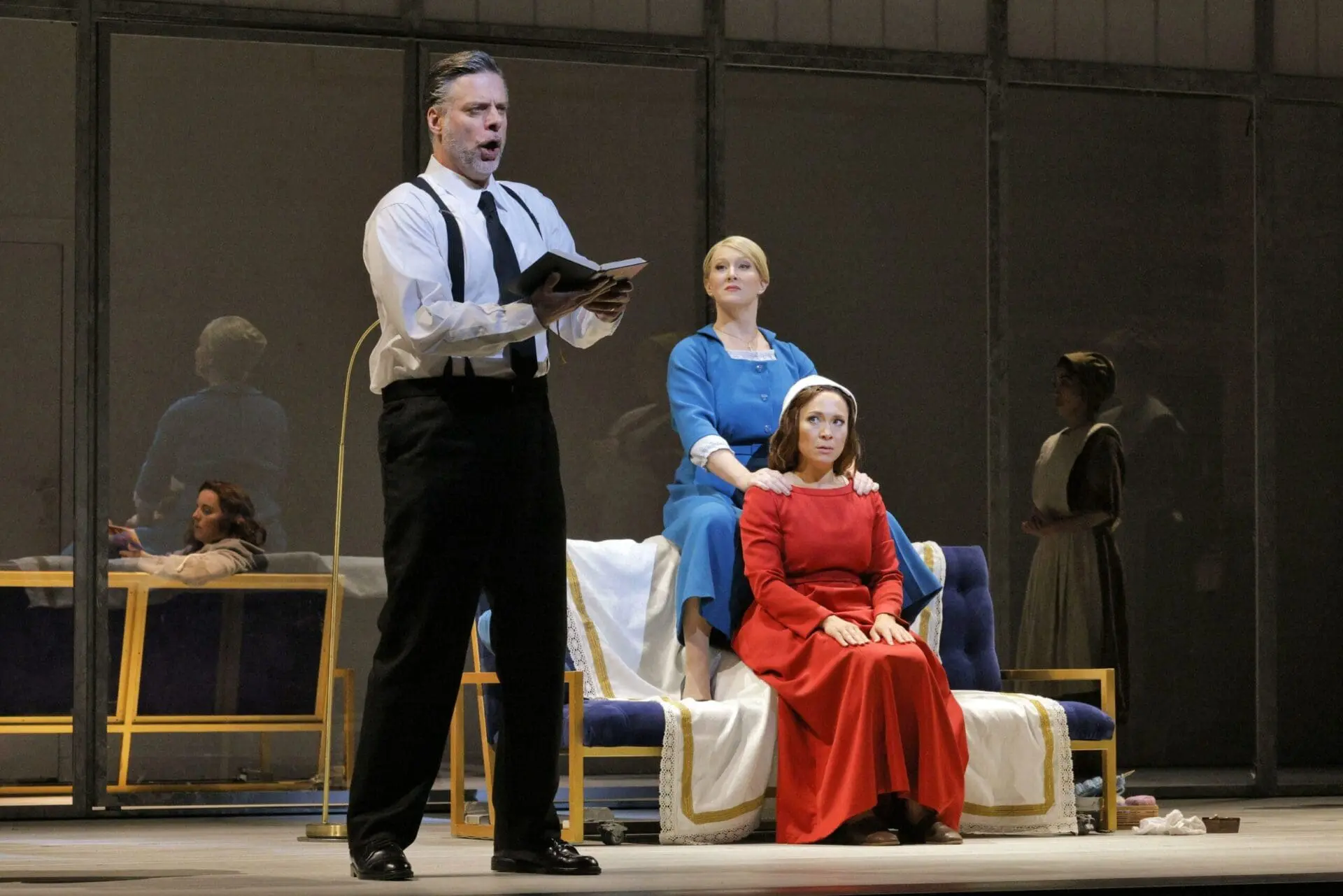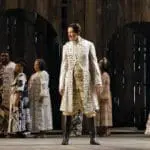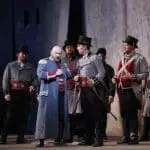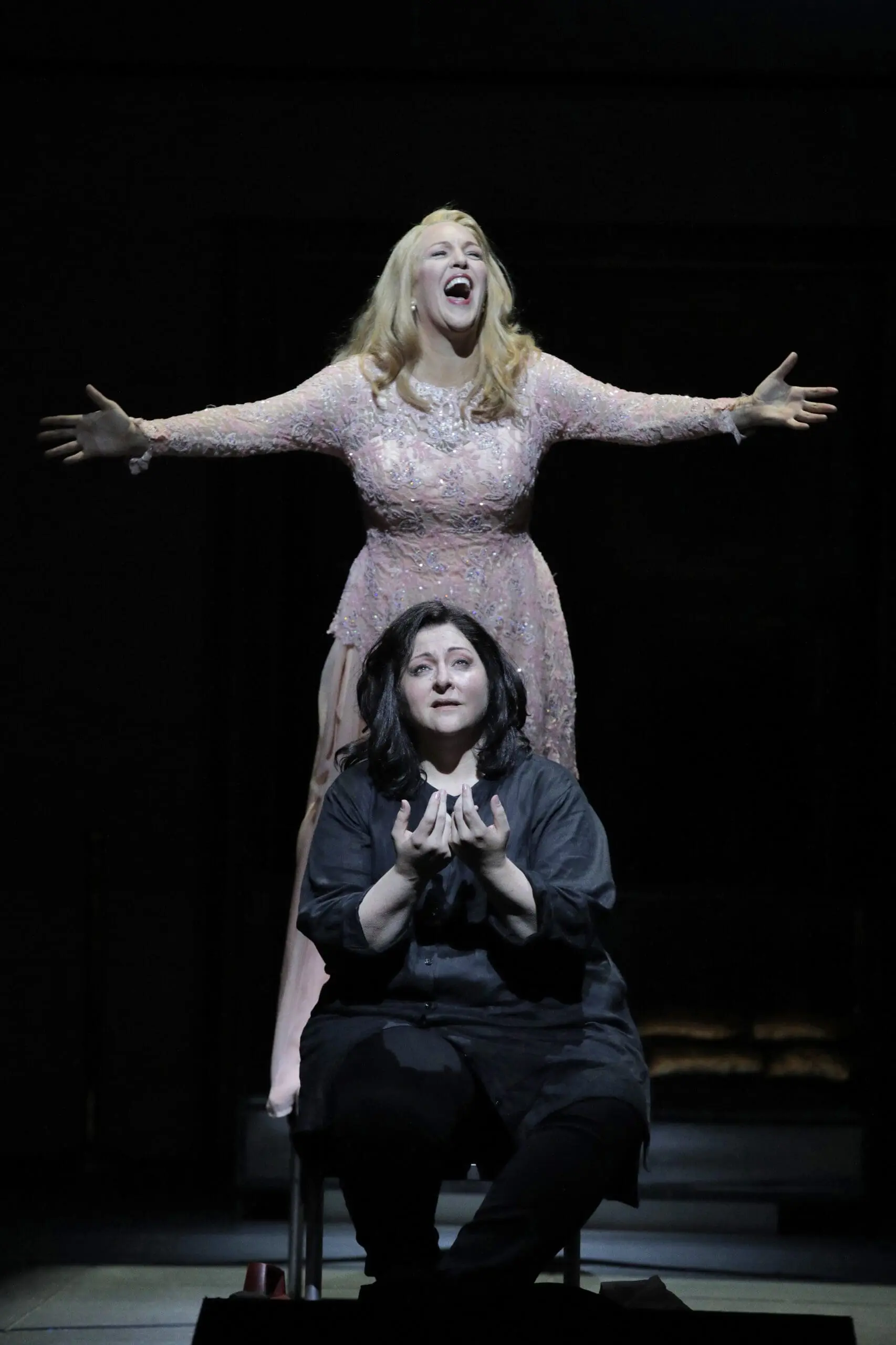Canadian singers colonized San Francisco Opera’s west coast premiere of The Handmaid’s Tale by Danish composer Poul Ruders, an opera from 2000 based on Margaret Atwood’s shockingly relevant dystopian novel. This indelible Canadian masterwork (1985) shows the terrified life of Offred, one of the few fertile women remaining in the Republic of Gilead. In Gilead, women have no reproductive rights or standing of any kind, and those who are fertile survivors of the old regime work as child-bearing slaves for the new realm’s elite.
In Gilead, the Handmaids – clad in bright red robes with huge white headdresses – are marshalled and trained by a regiment of brutal Aunties, uniformed in military olive drab and led by the vicious dominatrix Aunt Lydia. Defiance, or even a mother’s madness after her deformed child is “put down,” brings capital punishment by hanging. Hanging bodies abound, and a climactic execution in Act Two is staged with graphic specificity.
Offred (a brilliant Irene Roberts) serves Commander Fred and his barren wife Serena Joy, a former television gospel singer (statuesque mezzo Lindsay Ammann). Canadian John Relyea takes the central role of Commander, a leader of the revolution and a founder of Gilead. His tall stature, bass resonance, and star authority certainly suit the part. The Commander’s vocal line, however, presented him with few chances for sustained singing and many for quasi-spoken delivery. Relief arrives when the Commander orders Offred to his office for illicit meetings to play Scrabble, to look at fashion magazines, to have a kiss “as if you meant it” and, when he eventually dresses her up, to sneak over to the elite night club/brothel, Jezebel’s.
Relyea may claim the doubtful honor, one hopes unique in opera, of enacting not one but two explicit sexual penetrations on stage as part of a bizarre Gilead ritual, in which the handmaid of the household sits between the legs of the barren wife and is, in effect, raped by the husband before witnesses. This is rough stuff, but we are also shown Offred’s explicit gynecological examination by a doctor who offers to impregnate her since, he claims, most of the commanders are sterile, and the festive spectacle of public birthing by Janine/Ofwarren (a superb Katrina Galka), who soon is to be hanged in madness.
It would hardly be possible to offer enough praise for Irene Roberts as Offred. This is a huge role, on stage for most of the opera, with broad, high-flying tessitura and outlandish dramatic demands. Offred’s character is laden with internal conflict and external stress, as well as tortuous memories of her failed escape from Gilead with her husband and daughter, whom she believes dead. Roberts managed all of this while singing with an intense beauty.
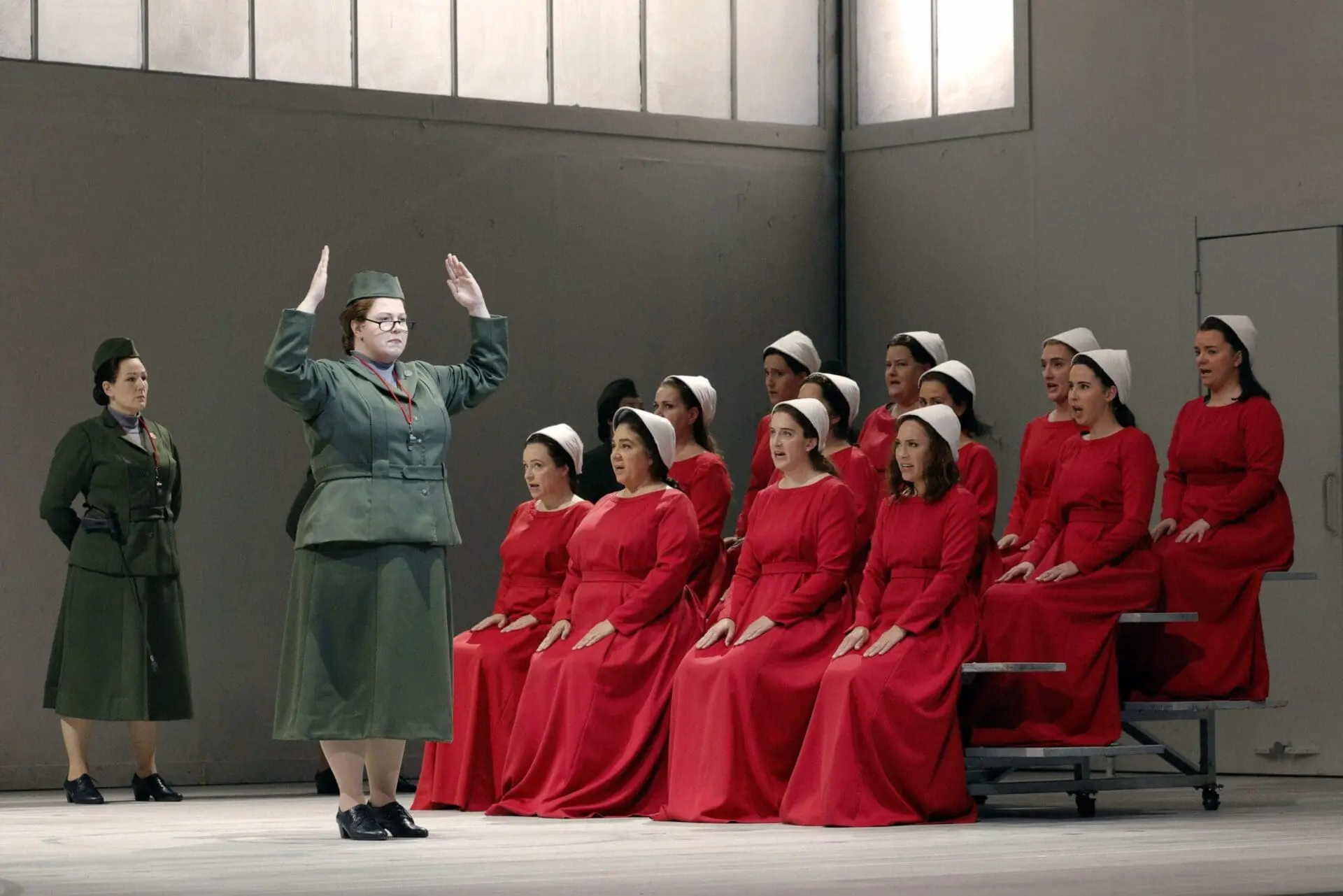
Photo Credit: Cory Weaver
Aunt Lydia (Sarah Cambidge) with the handmaids
Canadian Sarah Cambidge, as Aunt Lydia, projected her character with the power and intensity of a Valkyrie. The part’s high tessitura seemed tailored for her compelling, wide-ranging soprano. Aunt Lydia hardly aims to charm, but Cambidge artfully managed hints of the woman beneath the caricature. She emerged as a star in this staging.
As Offred’s best friend Ofglen, Canadian Rhoslyn Jones sings impressively and offers strong characterization. She managed her evenly calibrated soprano elegantly, slowly and subtly revealing herself as a member of the Mayday resistance movement and offering Offred a way out with the secret password.
Many fine singers and their characters have been left out in this review. But one figure demands attention: Offred’s double, representing who she was in the old world. Librettist Paul Bentley created this figure, who does not exist in the novel, to embody Offred’s recollections and reflections from Atwood’s first-person prose narrative. Offred’s double, husband and daughter weave through the action. Excellent vocally and physically matched, the double (Simone McIntosh) and Offred sing two long duets about their daughter, lovely set pieces containing some of the only lyrical passages in the score.
Bentley solved one problem with the double but created others. Her random appearances, the profusion of characters and countless short scenes mean that just too much is jammed into this opera. Even the strong imagery of John Fulljames’s staging and the explicit brutality of several scenes do not resolve the built-in confusion.
Chloe Lamford’s stripped down stage box, often with mirrors and a drop of the “Eye of God,” proved starkly efficient, though the frequent merging of three settings sprawled across the stage could be confusing. Costumes by Christina Cunningham were skilled if limited by the story’s strict demands. Lighting was atmospheric (Fabiana Piccioli) and sound nicely unobtrusive (Rick Jacobsohn).
Karen Kamensek most capably led the large, quite percussion-heavy orchestra – a conventional orchestration apart from the addition of synthesizer. The score abounds in large brass and percussion outbursts that often punctuate breaks between the numerous scenes. Ruders routinely signals suspense and fear with suspended strings over lightly thumping bass, but these devices grow tiresome. The lyrical passages – two duets and an Act One aria for Offred – are touching but not memorable.
The most striking feature of the meandering score is the repeated use of the hymn “Amazing Grace.” It appears, for instance, during the ritual sex scenes and at Jezebel’s. Does this signal heavy-handed irony? Possibly, but the audience appeared unbothered and showed energetic appreciation at the conclusion of the work.
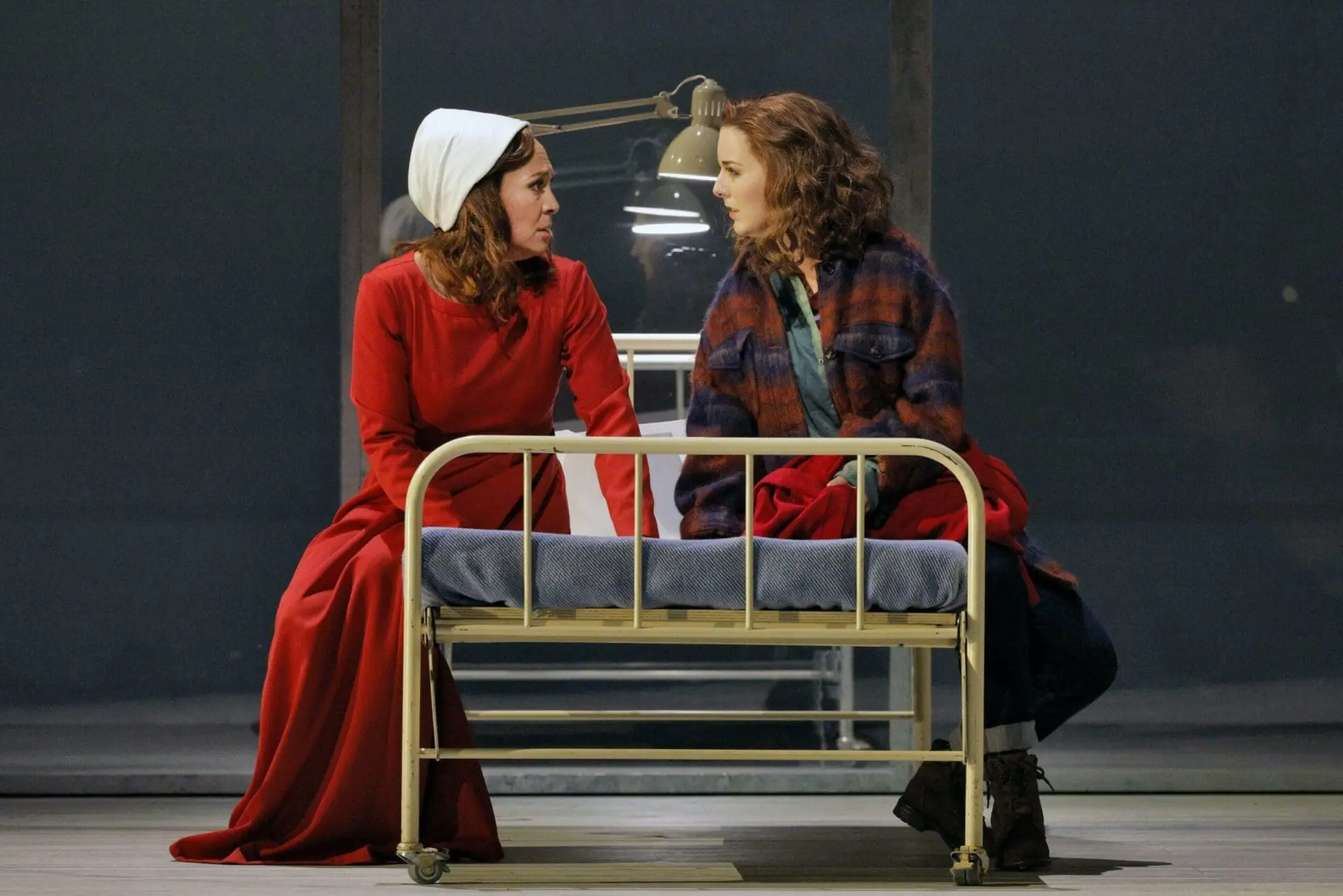
Photo Credit: Cory Weaver
Irene Roberts and Simone McIntosh as Offred and Offred Double in The Handmaid’s Tale at San Francisco Opera
Opera Canada depends on the generous contributions of its supporters to bring readers outstanding, in-depth coverage of opera in Canada and beyond. Please consider subscribing or donating today.


